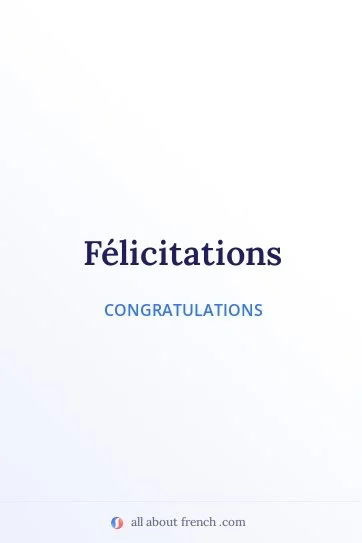
Get prepared to discover all the things you have to know about the basic French word "Félicitations". Including a full definition of what it is and how to use it in a normal conversation with an audio example.Additionally, we also added some useful things like dialogue example, synonym, slow pronunciation audio and more!
Translation : Congratulations
Register : Neutral - Basic
Slow
Normal
IPA : / felisitasjɔ̃ /

This word is the easiest way to say someone "Congratulations" in French. This is the plural form of "Félicitation", we use the plural because when you congratulate someone, what you imply is "I'm giving you my congratulations".
Use it when you want to congratulate someone about an achievement, a success or an important step of their life. This typically includes: having a kid, wedding, promotion, business success, buying a house, etc.
When someone around you is achieving something and you want to congratulate this person, you can use: "Félicitations !". For example, your brother passed an important exam, so you might say: "Félicitations !" (Congratulations).
In case you want to be more precise about what you are congratulating him, you can use "Félicitations pour + topic". In the example above it would be: "Félicitations pour ton examen !" (Congratulations for your exam!)
This is the neutral way, but in case you need something more formal you can use instead: "Mes sincères félicitations" (My sincere congratulations) or "Toutes mes félicitations" (All my congratulations). This is particularly useful for work emails and formal situations.
And in case you want something more familiar, you have variations such as "Bien joué !" (Well done) or "Chapeau !" (Hats off) or "Bravo !" (Bravo!)
Finally, if you want a slang version, you have "Bien ouej" which is the reversed version of "Bien joué" and which means "Lit / Well done".
If you want more variations, check the next section! But with that you will have enough for 99% of situations.
Dialogue
J'ai réussi mon examen !
I passed my exam!
Félicitations !
Congratulations!
Merci ! Je suis aux anges !
Thanks! I'm ecstatic!
Learn French with Audio Stories
Learn French the easy way with our French - English
parallel texts with slow French audio
 Start Learning
Start Learning 